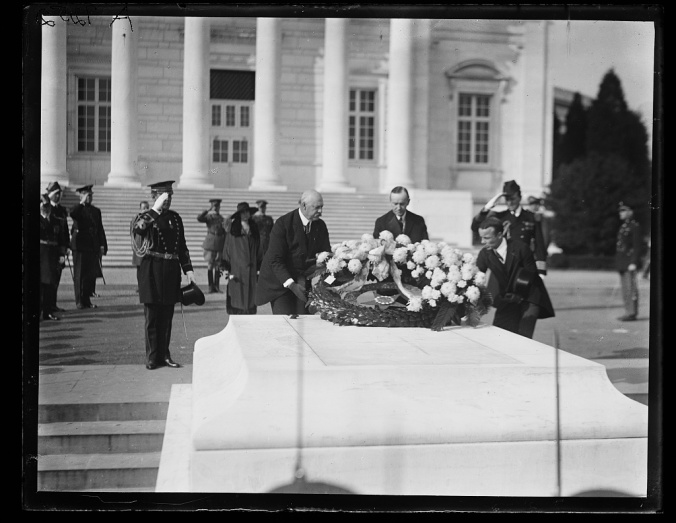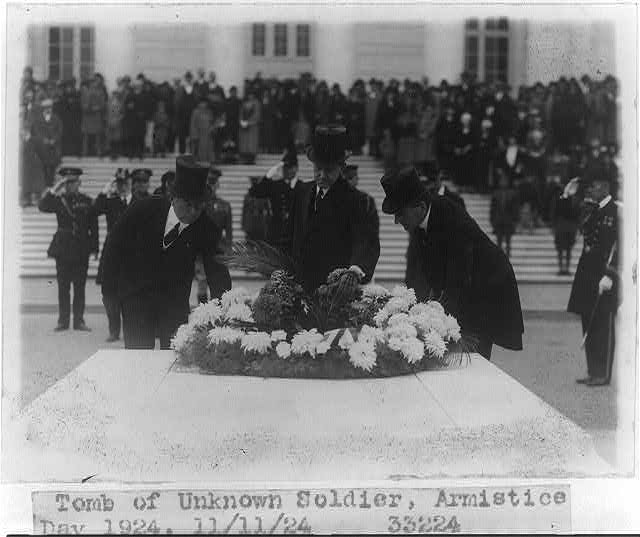
President Coolidge, Secretary of War Weeks and Assistant Secretary of the Navy Theodore Roosevelt Jr., placing a wreath at the Tomb of the Unknown Soldier, 1923. Photo credit: Library of Congress.
“To get a few days’ rest I went to Maine the next Friday after the election. It was there that I was awakened in the middle of Sunday night to be told that the Armistice had been signed. I returned to Boston the following day to take part in the celebration. What the end of the four years of carnage meant those who remember it will never forget and those who do not can never be told. The universal joy, the enormous relief, found expression from all the people in a spontaneous outburst of thanksgiving.” — Calvin Coolidge, The Autobiography p.123.
Looking back 10 years later in 1928 in Washington, D.C., President Coolidge observed:
“We are able to participate in this celebration because our country had the resources, the character, and the spirit to raise, equip, and support with adequate supplies an Army and a Navy, which, by placing more than 2,000,000 men on the battle fields of Europe contributed to the making of the armistice on the 11th day of November, 1918.
“Our first thought, then, is to acknowledge the obligation which the Nation owes to those who served in our forces afloat and ashore, which contributed the indispensable factor to the final victory. Although all our people became engaged in this great conflict, some in furnishing money, some in producing food and clothing, some in making munitions, some in administering our Government, the place of honor will always be accorded to the men and the women who wore the uniform of our country – the living and the dead.
“As we contemplate the past 10 years, there is every reason to be encouraged. It has been a period in which human freedom has been greatly extended, in which the right of self-government has come to be more widely recognized. Strong foundations have been laid for the support of these principles. We should by no means be discouraged because practice lags behind principle. We make progress slowly and over a course which can tolerate no open spaces. It is a long distance from a world that walks by force to a world that walks by faith. The united States has been so placed that it could advance with little interruption along the road of freedom and faith.
“It is befitting that we should pursue our course without exultation, with due humility, and with due gratitude for the important contributions of the more ancient nations which have helped to make possible our present progress and our future hope. The gravest responsibilities that can come to a people in this world have come to us. We must not fail to meet them in accordance with the requirements of conscience and righteousness.”
From 1927 in the White House:
By the President of the United States of America
A Proclamation“Whereas, the 11th of November, 1918, marked the cessation of the most destructive, sanguinary and far-reaching war in human annals; and Whereas, it is fitting that the recurring anniversary of this day should be commemorated with thanksgiving and prayer, and by exercises designed to further the cause of permanent peace through the maintenance of good will and friendly relations between nations; and Whereas, by concurrent resolution of the Senate and the House of Representatives, in 1926, the President was requested to issue a proclamation for the observance of Armistice Day:Now, Therefore, I, Calvin Coolidge, President of the United States of America, in pursuance of the said concurrent resolution, do hereby order that the flag of the United States be displayed on all Government buildings on November 11, 1927, and do invite the people of the United States to observe the day in schools and churches, and other suitable places, with appropriate ceremonies, giving expression to our gratitude that peace exists and to our sincere desire that such amicable relations with all other peoples may continue…”
From 1926 at Kansas City before the Liberty Memorial:
“No one can doubt that our country was exalted and inspired by its war experience. It attained a conscious national unity which it never before possessed. That unity ought always to be cherished as one of our choicest possessions. In this broad land of ours there is enough for everybody. We ought not to regret our diversification, but rather rejoice in it. The seashore should not be distressed because it is not the inlands, and the fertile plains ought not to distracted because they are not the mountain tops. These differences which seem to separate us are not real. The products of the shore, the inlands, the plain, and the mountain reach into every home. This is all one country. It all belongs to us. It is all our America.
“We had revealed to us in our time of peril not only the geographical unity of our country, but, what was of even more importance, the unity of the spirit of our people. They might speak with different tongues, come from most divergent quarters of the globe, but in the essentials of the hour they were moved by a common purpose, devoted to a common cause, and loyal to a common country. We should not permit that spirit which was such a source of strength in our time of trial to be dissipated in the more easy days of peace. We needed it then and we need it now. But we ought to maintain it, not so much because it is to our advantage as because it is just and human and right.
“Our population is a composite of many different racial strains. All of them have their points of weakness; all of them have their points of strength. We shall not make the most progress by undertaking to rely upon the sufficiency of any one of them, but rather by using the combination of the power which can be derived from all of them. The policy which was adopted during the war of selective service through the compulsory Government intervention is the same policy which we should carry out in peace through voluntary personal action. Our armies could not be said to partake of any distinct racial characteristic; many of our soldiers were foreigners by birth, but they were all Americans in the defense of our common interests. There was ample opportunity for every nationality and every talent. The same condition should prevail in our peace-time social and economic organization. We recognize no artificial distinctions, no hereditary titles, but leave each individual free to assume and enjoy the rank to which his own services to society entitle him. This great lesson in democracy, this great example of equality which came to us as the experience of the war, ought never to be forgotten. It was a resurgence of the true American spirit which combined our people through a common purpose into one harmonious whole. When armistice day came in 1918, America had reached a higher and truer national spirit than it ever before possessed. We at last realized in a new vision that we were all one people…”
From 1925, giving his views on the observance of Armistice Day, which he believed kept its most potent and personal meaning when the occasion was honored individually and voluntarily. He observed the day with the custom of laying a wreath upon the tomb of the Unknown Soldier at Arlington on the 11th hour of the 11th day of the 11th month (1925 being the seventh year since the end of what was then the Great War). In his press conference on November 3, 1925, he expressed the importance of personal (as opposed to Congressionally mandated) observance this way:
“My feeling about it is rather to the effect that it ought to be left to the disposition of different localities, I was going to say different individuals. The Congress has not, as it is stated here, made that a national holiday, but its observance has been quite universal I think in past years, and I should imagine that the best rule to follow as far as any standard that I could lay out would be for each individual or each industry or each locality to make such observance of the day as they think is fitting. I believe it has been my practice to go over on that day and put a wreath on the tomb of the Unknown Soldier, and I am planning to carry out that practice this year. Then I think they usually have meetings of one kind or another in the usual places of assemblage. Probably there is some observance of it in the public schools, some observance in places of public worship sometimes during the day and sometimes during the evening. I think those are all appropriate.”
To Coolidge, marking the end of that universally sanguine yet horrific war, brought Americans of all communities together because it was fought and won by everyone sacrificing and serving side-by-side. It left a profound demonstration of what mighty good comes when Americans unify around the principles and common purpose we share instead of fueling a thousand antagonisms that keep us apart, feed the animus to one another, and tear down when what we need most is building up. Yet, November 11th retained something very personal to each individual. Coolidge understood it might lose that personal regard if it were to become just another nationalized day off. For Coolidge, the Day meant the most when its meaning was kept alive through individual and voluntary remembrance. Whose service do you remember on this Day?
It has always been easier to destroy and tear apart, to vilify and divide. There have always been those trying to uproot and supplant, seeking to forge some short-cut past the slow, difficult task of living up to that high calling: American citizenship. Their impatience toward and disrespect for the source of law and self-government only worsen the situation. Forcing “them” into generalized camps against “us” only thrives when the same prejudice and bigotry attributed to others is lived by their accusers. It enslaves the mind and poisons the heart and, in the end, thwarts what good rests in the power of each person to choose. We often miss the opportunity in our reach because of a fixation on what we deem to be others’ imperfections.
As Coolidge knew, there is no quick route, no magic law or public ordinance that can improve upon what 1776 discovered about humanity, government, and each one’s part on this side of eternity. Like the aftermath of the war that ended one hundred years ago, we would better use the time to edify and build up each other and by so doing, find a more rewarding outcome in the end. It will prove a service worthy of the generations of hardy pioneers and humble innovators who bequeathed the best they had to this exceptional idea called America.

President Coolidge, Secretary of War Davis and Secretary of the Navy Wilbur present the wreath at Arlington, 1924. Photo credit: Library of Congress.
This is a great post. It was a remarkable gift of Providence that at a time when racism and religious prejudice were commonplace, the United States had as its President a man of who had such a deep appreciate of American diversity, of what makes America America.